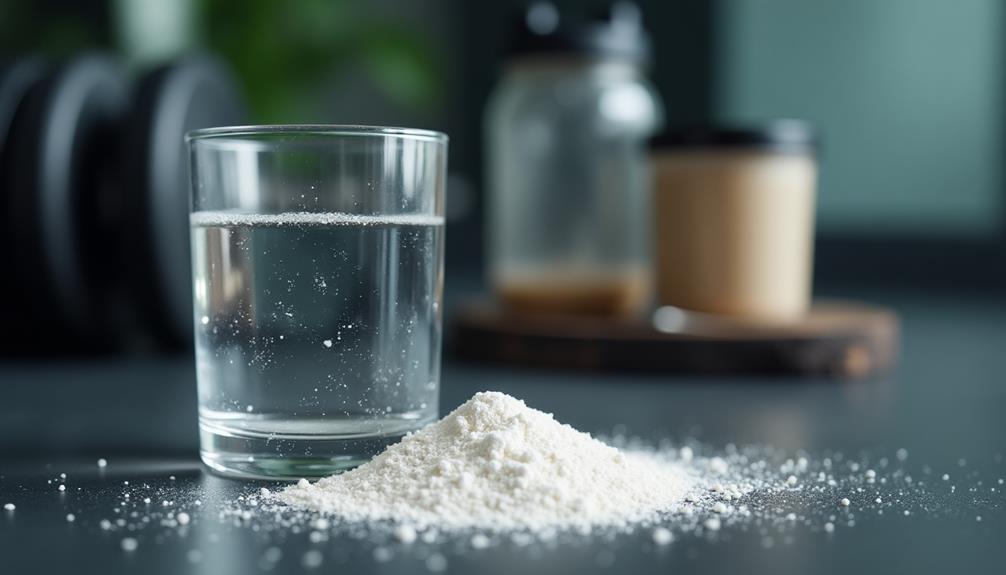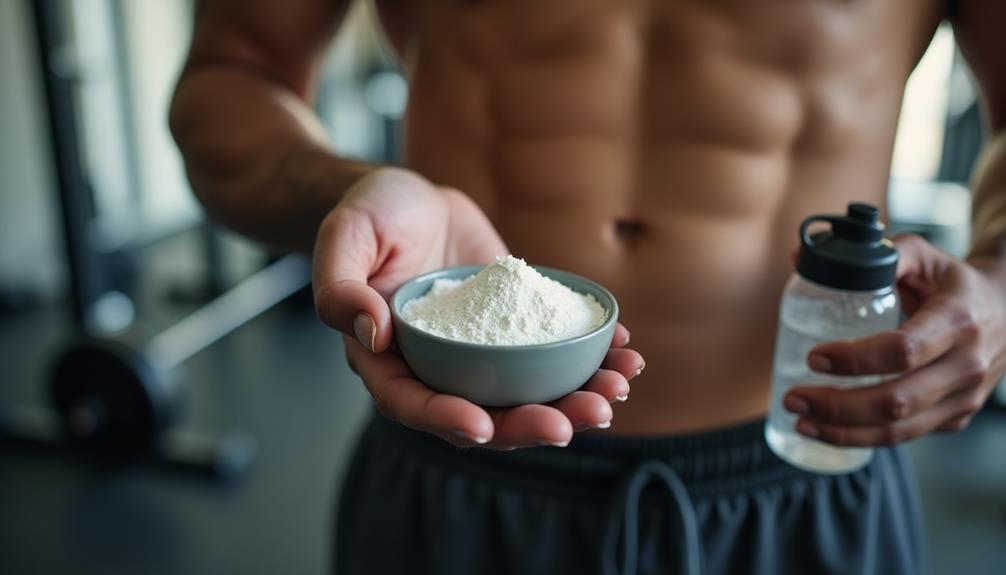To optimize your post-workout muscle recovery, consider these seven essential supplements. First, protein powder offers essential amino acids for healing. Second, branched-chain amino acids reduce soreness and enhance growth. Third, creatine monohydrate replenishes energy and reduces muscle fatigue. Fourth, omega-3 fatty acids combat inflammation and support joint health. Fifth, glutamine aids muscle repair and boosts your immune system. Sixth, tart cherry juice provides antioxidants and improves sleep quality. Lastly, electrolyte supplements help restore minerals lost through sweat, preventing cramps. By incorporating these, you can enhance your recovery process significantly, and there's more important information to explore.
Core Insights
- Protein powder provides essential amino acids for muscle recovery and is convenient to mix into foods post-workout.
- Branched-chain amino acids help reduce muscle soreness and enhance overall performance during and after workouts.
- Creatine monohydrate replenishes energy stores, reduces soreness, and speeds up recovery with consistent daily use.
- Omega-3 fatty acids support muscle repair and reduce inflammation, improving the recovery process after exercise.
- Glutamine aids in muscle recovery, reduces soreness, and supports immune function, making it crucial post-exercise.
Protein Powder

Protein powder is one of the most effective supplements for post-workout muscle recovery. After a tough workout, your muscles need protein to repair and grow stronger. By consuming protein powder, you're providing your body with the essential amino acids it craves. It's convenient, too; you can mix it into shakes, smoothies, or even oatmeal. Whey protein powders typically offer 24-25g of protein per serving, with some formulations providing up to 26g of high-quality protein to support muscle recovery. Additionally, many protein powders are low in fat and sugar, making them an excellent choice for those watching their macronutrient intake.
Timing matters, so try to consume your protein within 30 minutes after exercising. This helps kickstart the recovery process, replenishing your energy stores and supporting muscle synthesis.
Choose a high-quality protein powder, like whey or plant-based options, based on your dietary preferences. Remember, while protein powder is beneficial, it shouldn't replace whole food sources of protein in your diet. Balancing both is key to optimal recovery and muscle growth.
Branched-Chain Amino Acids

When you push your limits during a workout, your muscles can benefit greatly from Branched-Chain Amino Acids (BCAAs). These essential nutrients play a key role in muscle recovery and can enhance your performance. BCAA supplements come in various forms, including powders and capsules, each offering unique benefits for different preferences and needs. Here are three major benefits of BCAAs:
- Reduced Muscle Soreness: BCAAs help decrease the soreness you feel after intense workouts, allowing you to get back to training sooner.
- Enhanced Muscle Growth: They stimulate muscle protein synthesis, which is crucial for building and repairing muscle tissue.
- Decreased Fatigue: BCAAs can help you feel less fatigued during workouts, giving you the energy to push through tough sessions.
Incorporating BCAAs into your post-workout routine can significantly improve your recovery process and overall performance.
Creatine Monohydrate

Taking creatine after your workouts supports recovery by helping to replenish energy stores. Micronized powder forms are particularly effective due to their enhanced absorption and mixability. You might notice reduced muscle soreness and faster recovery times, allowing you to train harder and more frequently.
To maximize its benefits, consider a daily dose of 3-5 grams. Consistency is key, so make it a part of your regular routine. With creatine, you're giving your muscles the support they need to recover and grow stronger.
Omega-3 Fatty Acids

Although many people associate omega-3 fatty acids with heart health, they also play an important role in post-workout muscle recovery. Incorporating omega-3s into your routine can enhance your recovery process in several key ways:
- Reduce Inflammation: Omega-3s help lower inflammation, which can alleviate soreness and speed up recovery time.
- Support Muscle Repair: These fatty acids aid in the repair of muscle tissues, promoting overall recovery after intense workouts.
- Improve Joint Health: By supporting joint lubrication, omega-3s can help you maintain a full range of motion, reducing the risk of injury.
To reap these benefits, consider adding sources like fatty fish, flaxseeds, or supplements to your diet. This way, you'll support your body's recovery more effectively.
Glutamine

While omega-3 fatty acids provide notable benefits for muscle recovery, glutamine also plays a vital role in enhancing your post-workout routine. This amino acid is essential for replenishing your muscles after intense exercise. It helps to reduce muscle soreness and accelerates recovery by supporting protein synthesis.
When you work out, your glutamine levels can drop substantially. Supplementing with glutamine can help restore these levels, ensuring your muscles recover more effectively. It also supports your immune system, which can be compromised after strenuous workouts.
For best results, consider taking glutamine within 30 minutes post-exercise. This timing maximizes its effectiveness, allowing you to bounce back quicker. Remember, incorporating glutamine into your regimen can make a change in your overall recovery process.
Tart Cherry Juice

- Reduces Inflammation: Tart cherry juice is rich in antioxidants, which help decrease inflammation caused by intense workouts.
- Improves Muscle Recovery: Studies suggest that consuming tart cherry juice may reduce muscle soreness and speed up recovery time after exercise.
- Enhances Sleep Quality: The natural melatonin content in tart cherry juice can promote better sleep, allowing your body to recover more effectively.
Electrolyte Supplements

Electrolyte supplements play an important role in your post-workout recovery, helping to replenish the minerals lost through sweat. When you exercise, you lose sodium, potassium, magnesium, and calcium, which are crucial for muscle function and hydration. Replenishing these electrolytes can prevent cramps, fatigue, and dehydration, allowing you to recover quicker and perform better in future workouts.
You can choose from various forms of electrolyte supplements, including powders, tablets, and ready-to-drink solutions. Look for options that contain a balanced mix of essential minerals without excessive sugars. Timing matters too; consuming electrolytes within 30 minutes after your workout maximizes their advantages. By incorporating electrolyte supplements into your routine, you'll support your body's recovery and maintain peak performance.
Frequently Asked Questions
How Do I Choose the Right Supplement Brand?
To select the appropriate supplement brand, investigate their reputation, verify third-party testing, review customer feedback, and compare ingredient quality. You'll want a brand that prioritizes transparency and uses scientifically-backed formulations to guarantee effectiveness.
Can I Rely Solely on Food for Recovery?
You can definitely rely on food for recovery, but it might not cover all your nutrient needs. Balancing whole foods with targeted supplements often maximizes your recovery and helps you reach your fitness goals faster.
How Long After a Workout Should I Take Supplements?
You should take supplements within 30 minutes to two hours after your workout. This timing helps maximize muscle recovery and nutrient absorption, ensuring your body gets what it needs to repair and rebuild effectively.
Are There Any Side Effects to Consider?
Taking supplements can feel like finding your way through a maze; you might encounter side effects like digestive issues or allergic reactions. It's important to monitor how your body responds and consult a professional if you're unsure.
How Do Supplements Interact With Medications?
Supplements can interact with medications in various ways, sometimes enhancing or diminishing their effects. It's important you consult your healthcare provider to guarantee safety and avoid potential complications when combining supplements with prescribed treatments.

